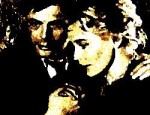Film Review

Bette Davis is reputed to have had great difficulty working with other actresses of her calibre. Petty rivalry with Miriam Hopkins during the shooting of The Old Maid (1939) had come perilously close to wrecking that production. The Great Lie was an exception, an occasion when Davis not only worked well with her co-star, Mary Astor, but was also instrumental in getting her cast. It was through their positive working relationship that Davis and Astor managed to knock what they felt was a disappointing soap into something worth watching. It helped that Astor was an accomplished pianist, and was therefore able to play her role with far more credibility than most actresses. Davis was originally reluctant to play the sympathetic lead role but was persuaded to do so on the insistence of her fans that she should play a nice character for once.
Plot-wise, The Great Lie is truly cringe-worthy, riddled with the kind of daft plot contrivances that you would expect to find only in a low-grade TV soap opera. And yet so gripping are the performances from Davis and Astor, so potent is the emotional realism that they bring to the film, that you hardly notice this. We accept the story, incredible as it is, because we accept the reality of the two main protagonists, two tragically vulnerable women who are vying for the love of the same man. The talented supporting cast includes the great African-American actress Hattie McDaniel, who had previously won an Oscar for her role in Gone with the Wind (1939). This was the last of four films which Edmund Goulding directed with Bette Davis, Dark Victory (1939) being their best known collaboration.
© James Travers 2010
The above content is owned by frenchfilms.org and must not be copied.
Film Synopsis
Peter Van Allen has been married to Sandra Kovak, a renowned concert pianist, for only a few days when he learns that the union is not legal. Sandra has mistaken the date of her divorce and is still legally wed to another man. When Sandra refuses to cancel a tour so that she can marry Peter again, Peter revisits his old flame Maggie Patterson and asks her to be his wife. Maggie, still madly in love with Peter, accepts willingly and the couple embark on a happy married life. At Maggie's insistence, Peter begins a career in aviation, but during a flight over Brazil his aircraft goes missing. Maggie then learns that Sandra is pregnant with her husband's child. Certain that Peter is dead, Maggie persuades Sandra to have the baby and hand it over to her, so that the child will be assured a secure future. Then, some months later, Peter makes an unexpected return. Sandra cannot stand by and allow Peter to accept the lie that Maggie is the mother of her child...© James Travers
The above content is owned by frenchfilms.org and must not be copied.
Similar Films
Here are some other films you may enjoy watching:- Le Roman de Werther (1938)
- Fazil (1928)
- White Cargo (1942)
- Les Bas-fonds (1936)
- The Snows of Kilimanjaro (1952)
Other related links:
Film Credits
- Director: Edmund Goulding
- Script: Lenore J. Coffee (play), Polan Banks (novel)
- Cinematographer: Tony Gaudio
- Music: Max Steiner
- Cast: Bette Davis (Maggie Patterson Van Allen), George Brent (Peter 'Pete' Van Allen), Mary Astor (Sandra Kovak), Lucile Watson (Aunt Ada Greenfield), Hattie McDaniel (Violet), Grant Mitchell (Joshua Mason), Jerome Cowan (Jock H. Thompson), Charles Trowbridge (Sen. Ted Greenfield), Thurston Hall (Worthington James), Russell Hicks (Colonel Harriston), Virginia Brissac (Sadie), J. Farrell MacDonald (Dr. Ferguson), Addison Richards (Mr. Talbot), Sam McDaniel (Jefferson Washington), Olin Howland (Ed), Georgia Caine (Mrs. Pine), Richard Clayton (Page Boy), Billy Eugene Ferris (Pete Van Allen Jr. 1), George Kirby (Minister), Doris Lloyd (Bertha, Sandra's Maid)
- Country: USA
- Language: English
- Support: Black and White
- Runtime: 108 min
The very best of Italian cinema

The best French Films of the 1910s

The best of British film comedies
